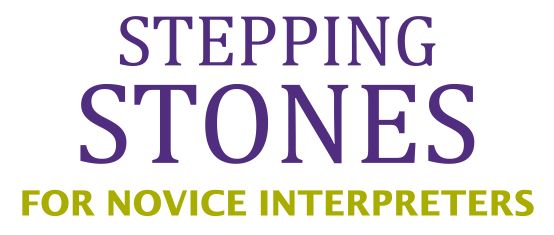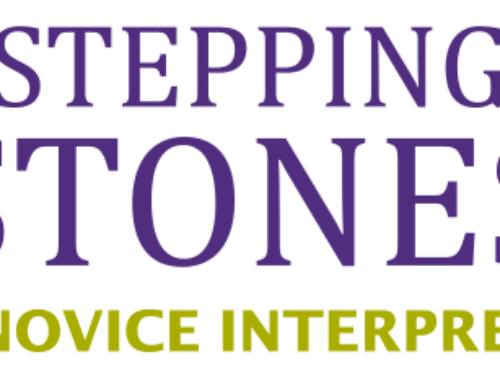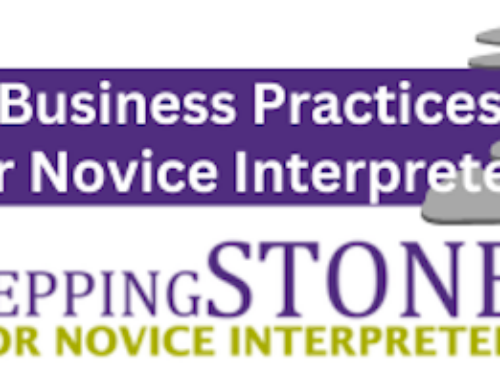
- Are you looking to elevate the level of your interpreting skills?
- Are you wanting to assess the impact your interpreting has on the impression of deaf people in job interviews?
- Are you interested in building your skills to help expand work opportunities for deaf people?
Check out this free online course on building capacity for reflective self-assessment. It is an offering in Stepping Stones for Novice Interpreters, a self-directed track from the CATIE Center’s Dive In project.
Interpreting for Job Interviews.

Description
In this course, we will explore the varying structures of job interviews (e.g., one-on-one, panel, video), their characteristics, participants, and strategies to prepare for and perform interpreting work in this setting. Similar to other settings, interpreting job interviews has a real life impact on all involved. As interpreters, we influence the impression that the applicant leaves with the hiring manager and, thus, their likelihood for hire, as well as the perception the applicant may have of the job for which they are applying. Recognizing power, privilege, and systemic structure, this course aims to support interpreters’ (hearing, hard of hearing, and Deaf Interpreters) readiness for this work.
The expected time commitment for this course is approximately 10-12 hours of engaging with the material, planning and self-assessment, and engaging in discussions on the learning platform, and an additional 8 hours engaged in skill-development focused practice.
Learning Objectives
Participants completing this course will:
- Describe characteristics of job interviews.
- Describe methods used to prepare for interpreting a job interview in varying settings.
- Explore language choices and decision-making in the job interview.
- Explore interpreting for job interviews that occur via video.
- Identify areas for improvement in your interpreting of job interviews
- Report back on effective strategies as well as challenges related to interpreting for job interviews
The course is designed to be completed over 6 weeks, at your own pace and takes at least 10 hours to complete. Each module will have a specific focus and include opportunities for application and reflection.
A Note on CEUs
Because our grant is focused on novice interpreters working toward certification, CEUs are not offered by the CATIE Center. The CATIE Center has an agreement with the Minnesota Registry of Interpreters for the Deaf.
For $40 (a cost set by MRID), you can receive ACET or CMP CEUs for this course. At the end of the course, you will have access to a form to apply for CEUs and receive a link for making the payment. So, you don’t have to commit to making a payment until you know that you will be able to complete the requirements. (MRID members receive a free processing of a Stepping Stones workshop, a PINRA, or an Independent Study each year – so if you are an MRID member, you can get this cost waived.) For more information on the CEU process, contact pdc@mrid.org.
Minnesota Registry of Interpreters for the Deaf is an approved RID Certification Maintenance Program (CMP) sponsor for continuing education activities. This professional studies program is offered for 1.0 CEUs at the some content knowledge level.
The CATIE Center promotes a mutually respectful learning environment free of bias. See St. Catherine University’s non-discrimination policy for more details.
Registration is open. Facilitation is available February 1-March 15, 2026.
The registration form will provide you a link to enroll in a free Canvas course. It will also ask for optional demographic information which will be helpful for the CATIE Center in evaluating the effectiveness of these resources for supporting the diversity of novice interpreters who are entering the interpreting field.
Learn about ongoing access to Stepping Stones courses
About Stepping Stones for Novice Interpreters
This course is part of a series developed by the Dive In project of the CATIE Center at St. Catherine University. Each module will have a facilitator from the CATIE Center who monitors a Support Forum. The activities are designed so that you can do them asynchronously. Though possible to do independently, we encourage you to either join as a group and work through the material together – or use the introduction forum to seek out others in the course who might work with you in the discussions. Collaborative learning can be a really important tool in professional development.


